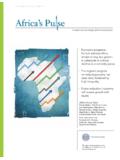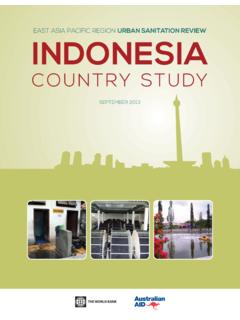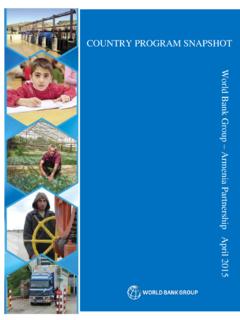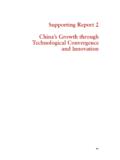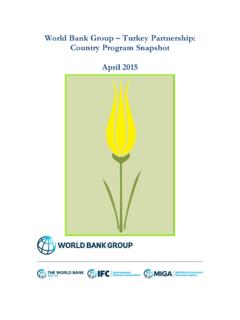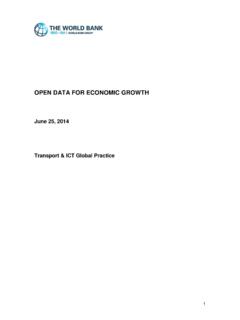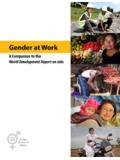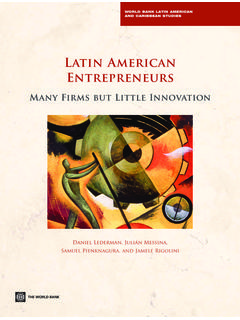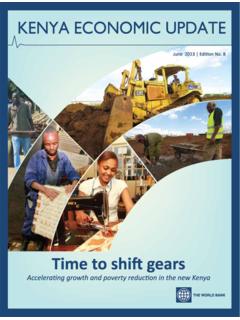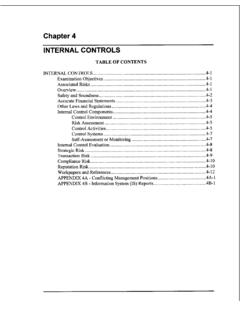Transcription of Doing Business: External Panel Review
1 Doing Business: External Panel Review Final Report September 1, 2021 Panel members: Laura Alfaro, Harvard University Alan Auerbach, University of California at Berkeley Mauricio C rdenas (Chair), Columbia University Takatoshi Ito, Columbia University Sebnem Kalemli- zcan, University of Maryland Justin Sandefur, Center for Global Development Seho Kim, Rodrigo Morales Mendoza, and Jenny Ning provided excellent research assistance. We re grateful to Carmen Reinhart, Aart Kraay, and Norman Loayza for helpful discussions, to Rita Ramalho who served as the main World Bank contact for the Panel , and to the entire Doing Business team for sharing their time through multiple meetings and detailed feedback on an earlier draft. We are also indebted to a long list of others who took time out to meet with the Panel and/or make written submissions. 2 Table of Contents Table of Contents Summary of recommendations Section 1. Introduction Overview and purpose of Doing Business Past reviews and changes to the Doing Business index The need for a new Review Section 2.
2 Data Collection Methodology Expanding the case study method to acknowledge firm heterogeneity and the informal sector Moving from de jure to de facto measurement of regulation Measuring an efficient business environment Indicators of limited relevance to SMEs The tension between relevance of methodological changes vs. comparability across time Rethinking aggregation and ranking Section 3. The Paying Taxes indicator Brief description of the Paying Taxes methodology Dealing with the Race to the Bottom: Should the TTCR indicator be removed or modified? Determining the scope of taxes to be considered Other Issues Section 4. New and expanded topic areas: Proposals from the Doing Business team Contracting with the Government Digital Business Indicators Revisiting the topic of Employing Workers Section 5. The role of international transactions Widening the scope of Trading across Borders : include tariffs and other costs and regulations International Financial Transactions Incorporating FDI Section 6.
3 Governance of Doing Business Three types of threats to the integrity of Doing Business Remedial actions 3 Annexes A. Summary of past reviews: recommendations and subsequent World Bank actions B. Summary of meetings and submissions to the Panel C. Doing Business 2020: Methodology notes and other site references 4 Summary of recommendations 1. The Doing Business project is a unique source of comparable global data, relevant for researchers, businesses, and policymakers, and potentially of great value to inform decisions by governments and firms. However, to unleash that potential the current methodology should be significantly modified, implying a major overhaul of the project. With that goal, this Review makes a number of recommendations that seek to improve the methodology behind the data, fill important gaps in its substantive coverage, clarify what can and cannot be said on the basis of the data, and protect the integrity of the data collection process. Importantly, our recommendations should be considered as a package in order to ensure a meaningful continuation of the Doing Business project.
4 A piecemeal approach would not produce the desired outcome. 2. Measure the de facto reality, not just de jure rules, facing a representative cross-section of firms. A long-standing concern with Doing Business shared by many stakeholders is that the focus on de jure regulation fails to capture the de facto reality of many businesses. The exclusive use of hypothetical case studies also fails to capture the diversity of firms and sectors within countries, and obscures critical cross-country differences. We recommend a substantial methodological shift in favor of more data collection from representative samples of actual business owners and operators on their de facto experiences of Doing business. 3. Include indicators measuring the positive functions of government in promoting a good business environment. In addition to regulating business activity, governments provide essential public goods to the private sector: transport and communications infrastructure, a skilled workforce, law and order, etc.
5 Doing Business ignores most of these functions. We recommend remedying this omission. 5 4. Expand coverage of international business issues. Currently, most indicators that are part of Doing Business focus exclusively on a hypothetical domestically-owned enterprise, very partially engaged in international trade. This omits an essential dimension of private investment decisions, making the Doing Business out of sync with what many readers seek from it. We recommend various ways to expand the international coverage of the indicators. 5. Remove the aggregate index and country rankings. Doing Business covers a diverse array of indicators that often have little meaning when aggregated with arbitrary weights. Furthermore, the underlying survey of experts measures laws and policies; it does not evaluate them. For some indicators, less is clearly better ( , delays in registering a business), while for others, optimal policy is far less clear ( , the optimal corporate tax rate). Publishing the indicators to enable further analysis elevates the level of global policy dialog; aggregating them and ranking countries lowers it, and invites the type of External interference and conflicts of interest witnessed in recent years.
6 6. Retain and improve the measurement of "Paying Taxes," including the Total Tax Contribution Rate (TTCR) , but do not rank countries on their tax rates. The tax indicator, and in particular the Total Tax Contribution Rate has come under heavy criticism. From a societal standpoint, collecting taxes is necessary, and thus lower tax rates are not necessarily better. Nevertheless, taxes impose costs on firms and are a central concern of any business. Therefore, we believe it's valuable for Doing Business to collect and report comparable data on tax systems, including tax rates. To improve this indicator, a comprehensive set of taxes should be considered, and the information should be presented in a transparent way without ad hoc adjustments or manipulation to reflect goals and preferences. However, it is equally important to capture better the benefits of taxation through expanded measures of public services that enable an efficient business environment (recommendation 3).
7 6 7. Eliminate the indicators Protecting Minority Shareholders and Resolving Insolvency. According to the assumptions of the corresponding case study, Protecting Minority Shareholders is based on the experience of listed companies, which are not representative of SMEs, especially in emerging and developing countries. Legal framework and practices of bankruptcy are sufficiently different across countries to merit a separate report every five years or so on practices across the world. 8. Make the "Contracting with Government" indicator more relevant. Public procurement constitutes a large share of aggregate demand in many sectors, and shapes the competitive environment faced by many firms. While the indicator is conceptually different from much of the rest of Doing Business, it has potential value as a data source, but is a lower priority than some other potential methodological revisions. In addition, the case study used appears unrealistic for many countries and firms and in need of revision.
8 9. Clarify the conceptual framework behind the Digital Business Indicators. No doubt it is appropriate for Doing Business to pay more attention to e-commerce and the digital needs of business across many sectors, so we support its inclusion. However, some aspects of the proposed new indicator appear unrelated to the digital focus, though, and fall into the same tendency to measure de jure rules rather than de facto realities. We suggest some adjustments that capture the accessibility, reliability, and cost dimension of digital services. 10. Restore and improve the "Employing Workers" indicator as part of Doing Business indicators, but do not rank countries based on this information. Our recommendation here is similar to the case of Paying Taxes. Labor costs are a central concern of most businesses, and labor regulation is a vital tool to protect workers, which should be measured as part of the Doing Business project assuming country rankings are removed. The underlying data in the "Employing Workers" indicator are a useful resource for 7 research and policy analysis, but it loses relevance when aggregated with other indicators.
9 Efforts begun in 2016 to expand coverage of dispute resolution mechanisms, availability of on-the-job training, and equal treatment of men and women should be revived. 11. Improve the transparency and oversight of Doing Business. The integrity of Doing Business has come under threat from internal and External pressure. We recommend a number of steps to rebuild the project's credibility: ensure anonymity of respondents to minimize government interference, increase the number of contributors and make their selection more impartial, publish anonymized data at the level of individual respondents to ensure full replicability of all analysis, reduce conflicts of interest with the Bank's lending and advisory roles, and consider an External advisory committee to operationalize the adoption of the suggested changes and to peer- Review the report prior to its publication. 8 Section 1. Introduction Overview and purpose of Doing Business Former World Bank chief economist Kaushik Basu has described the Doing Business report as the Bank s most cited and most contentious It routinely garners high-profile coverage on the front pages of the Financial Times and Wall Street Journal, features in national electoral campaigns, and has been cited internally by the World Bank as the basis for $ billion in lending2 In recent years, the Doing Business program has also become embroiled in controversy, culminating with the revelation in 2020 that some scores had been manipulated by members of the Doing Business Stepping back, the basic goal of the Doing Business project is to quantify business regulations in a comparable way across eleven dimensions and 191 countries, focusing on domestic, small and medium enterprises.
10 Despite a previous recommendation to stop the use of aggregate rankings and focus on cardinal scores for individual indicators4, the annual Doing Business report continues to aggregate all these indicators with less regulation originally coded as better, albeit with a growing list of qualifiers to allow some room for minimal taxation, safety regulations, investor protections, and so on and ranks countries from best to worst, with special attention on top reformers. 1 Kaushik Basu (2018), The ease of Doing business comes with trade-offs . Brookings Institution, March 12, 2018. 2 Draft IEG report, Doing Business and Country Reforms, as presented to the External Review Panel in August 2021. The total figure of $ billion in lending spans 681 projects that (a) use Doing Business in their Board documents to justify the project, or (b) have one or more DB indicators in either their objectives, or (c) monitoring indicators, or (d) are intended specifically to inform DB indicators.

